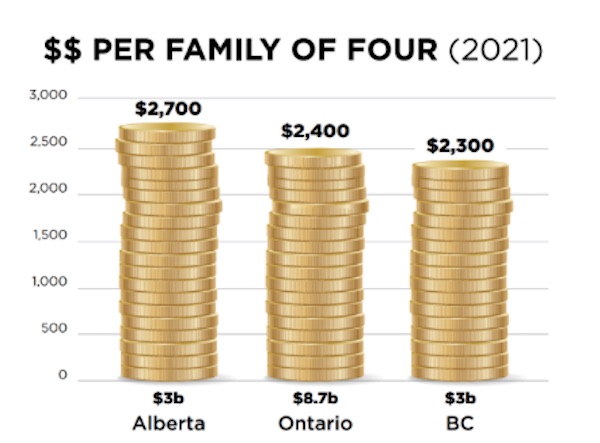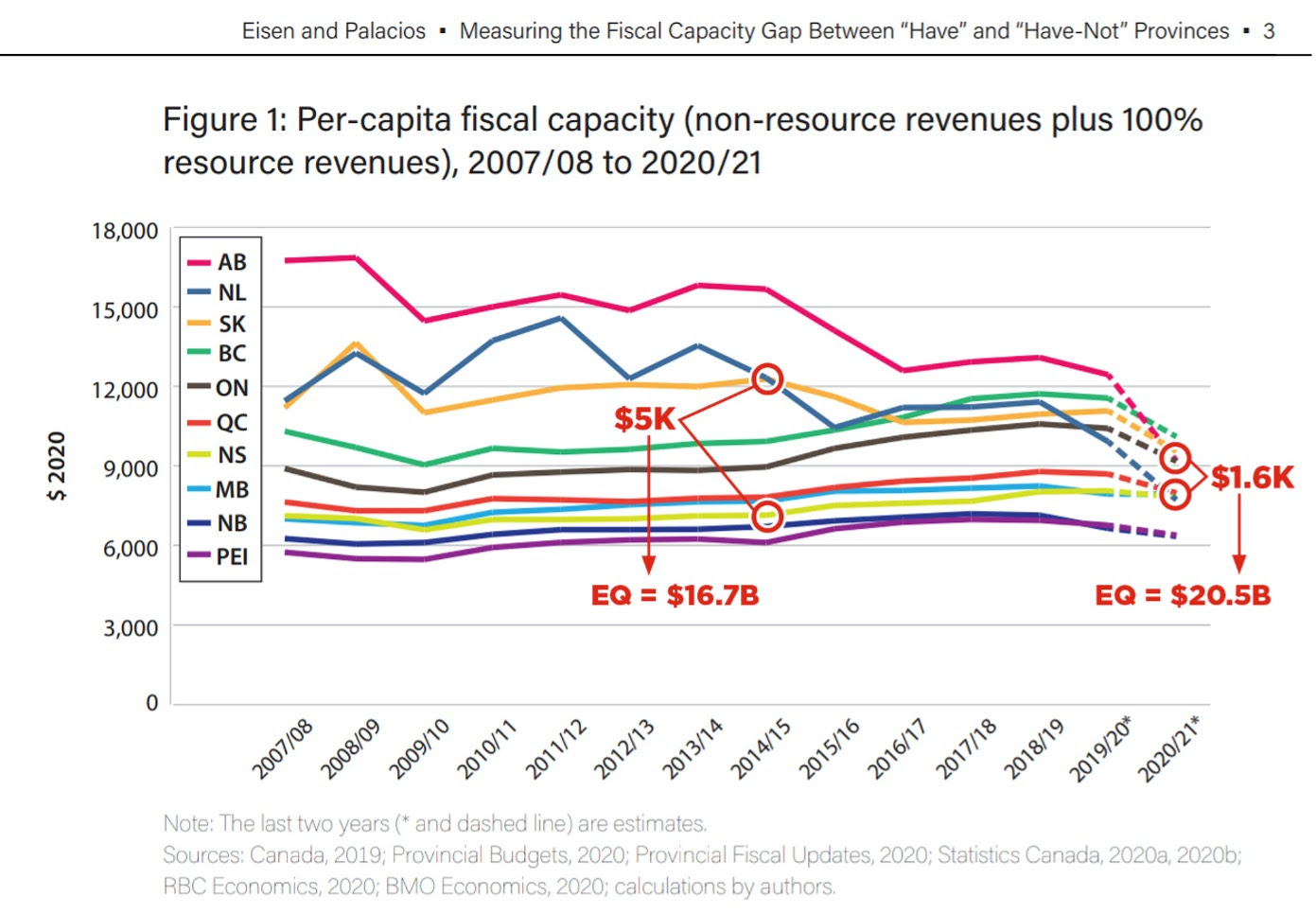Alberta
Equalization payments aren’t just controversial in Alberta anymore! Ontario poll shows overwhelming negative view

News release from Fairness Alberta
POLL: VAST MAJORITY OF ONTARIANS SAY EQUALIZATION PAYMENTS ARE UNFAIR
Fairness Alberta calls for $8 billion rebate for Ontario
Fairness Alberta has released a poll showing 73% of Ontarians believe ever-growing Equalization payments are unfair given the narrowing wealth gap between provinces since 2015.
The poll, from a weighted survey of 1,000 Canadians recently conducted by the Toronto firm One Persuasion Inc. (MoE +/-3.1%), showed a large majority of Ontarians said it is unfair that Equalization payments rose 23% since 2015, making Ontario’s share of funding the program equivalent to roughly $2400 per family of four (see bottom). Opposition to the status quo on Equalization was highest in the 905 region of suburban Toronto.

(To see the full results of the poll click here)
“Ontarians have been funding unfairly high Equalization payments for others while their own provincial government was struggling to pay for services even before COVID-19,” said Fairness Alberta Executive Director Dr. Bill Bewick. “Given the collapse of the wealth gap between provinces, the so-called ‘have’ provinces should get the share of Equalization that came from their taxpayers rebated until we achieve meaningful reforms to federal-provincial funding.”
As Dr. Bewick outlined in the National Post, even a 50% rebate would mean a bump to provincial budgets of $4 billion in Ontario and $1.5 billion being returned to B.C. and Alberta as their provincial responsibilities come under strain.
“The $21 billion-and-growing price tag for Equalization is totally unnecessary and unaffordable given how much more equal provinces have become since 2015,” added Dr. Bewick. “This isn’t just an Alberta problem. Ontario, B.C., Alberta, Saskatchewan, and Newfoundland make up nearly 70% of Canada’s population and it has become obvious that the program is unfair to all of them.”
A recent study by Ben Eisen and Milagros Palacios illustrates the “Great Convergence” in provincial fortunes since the 2015 energy downturn. While the gap between the median ‘have’ and ‘have not’ fell from $5000 per person in 2015 to only $1600 in 2020, Equalization payments grew 23%. With increases tied to national GDP rather than need, a $20.9 billion windfall is going to 5 provinces (with less than 1/3 of the population) in 2021.

About Fairness Alberta:
Fairness Alberta is a grassroots, non-partisan, and non-separatist association of concerned citizens, aiming to increase awareness across the country about Albertans’ disproportionate contributions to Canada, while also providing clear, factual information on unfair federal policies that will further undermine the prosperity of Alberta and other contributing provinces.
Fairness Alberta previously released analysis and recommendations for reforms to Equalization and the Fiscal Stabilization program, with an overview of fiscal federalism as well at www.fairnessalberta.ca.
Previous releases, interviews, columns, and two presentations to the House of Commons Standing Committee on Finance can be found in the NEWS section of our website. For more information on Fairness Alberta, its mandate, and future plans, please visit our website at www.fairnessalberta.ca.
For further information or to arrange interviews, please contact:
Bill Bewick, Ph.D.
Executive Director
Fairness Alberta
Cell: (780) 996-6019
Email: bill.bewick@

*per-province calculations based on provincial contributions to general revenue proportionally applied to the $20.9b spent on Equalization in 2021. Source for per-province shares is this Library of Parliament document: https://lop.parl.ca/sites/
Alberta
Made in Alberta! Province makes it easier to support local products with Buy Local program

Show your Alberta side. Buy Local. |
When the going gets tough, Albertans stick together. That’s why Alberta’s government is launching a new campaign to benefit hard-working Albertans.
Global uncertainty is threatening the livelihoods of hard-working Alberta farmers, ranchers, processors and their families. The ‘Buy Local’ campaign, recently launched by Alberta’s government, encourages consumers to eat, drink and buy local to show our unified support for the province’s agriculture and food industry.
The government’s ‘Buy Local’ campaign encourages consumers to buy products from Alberta’s hard-working farmers, ranchers and food processors that produce safe, nutritious food for Albertans, Canadians and the world.
“It’s time to let these hard-working Albertans know we have their back. Now, more than ever, we need to shop local and buy made-in-Alberta products. The next time you are grocery shopping or go out for dinner or a drink with your friends or family, support local to demonstrate your Alberta pride. We are pleased tariffs don’t impact the ag industry right now and will keep advocating for our ag industry.”
Alberta’s government supports consumer choice. We are providing tools to help folks easily identify Alberta- and Canadian-made foods and products. Choosing local products keeps Albertans’ hard-earned dollars in our province. Whether it is farm-fresh vegetables, potatoes, honey, craft beer, frozen food or our world-renowned beef, Alberta has an abundance of fresh foods produced right on our doorstep.
Quick facts
- This summer, Albertans can support local at more than 150 farmers’ markets across the province and meet the folks who make, bake and grow our food.
- In March 2023, the Alberta government launched the ‘Made in Alberta’ voluntary food and beverage labelling program to support local agriculture and food sectors.
- Through direct connections with processors, the program has created the momentum to continue expanding consumer awareness about the ‘Made in Alberta’ label to help shoppers quickly identify foods and beverages produced in our province.
- Made in Alberta product catalogue website
Related information
Alberta
Province to expand services provided by Alberta Sheriffs: New policing option for municipalities

Expanding municipal police service options |
Proposed amendments would help ensure Alberta’s evolving public safety needs are met while also giving municipalities more options for local policing.
As first announced with the introduction of the Public Safety Statutes Amendment Act, 2024, Alberta’s government is considering creating a new independent agency police service to assume the police-like duties currently performed by Alberta Sheriffs. If passed, Bill 49 would lay additional groundwork for the new police service.
Proposed amendments to the Police Act recognize the unique challenges faced by different communities and seek to empower local governments to adopt strategies that effectively respond to their specific safety concerns, enhancing overall public safety across the province.
If passed, Bill 49 would specify that the new agency would be a Crown corporation with an independent board of directors to oversee its day-to-day operations. The new agency would be operationally independent from the government, consistent with all police services in Alberta. Unlike the Alberta Sheriffs, officers in the new police service would be directly employed by the police service rather than by the government.
“With this bill, we are taking the necessary steps to address the unique public safety concerns in communities across Alberta. As we work towards creating an independent agency police service, we are providing an essential component of Alberta’s police framework for years to come. Our aim is for the new agency is to ensure that Albertans are safe in their communities and receive the best possible service when they need it most.”
Additional amendments would allow municipalities to select the new agency as their local police service once it becomes fully operational and the necessary standards, capacity and frameworks are in place. Alberta’s government is committed to ensuring the new agency works collaboratively with all police services to meet the province’s evolving public safety needs and improve law enforcement response times, particularly in rural communities. While the RCMP would remain the official provincial police service, municipalities would have a new option for their local policing needs.
Once established, the agency would strengthen Alberta’s existing policing model and complement the province’s current police services, which include the RCMP, Indigenous police services and municipal police. It would help fill gaps and ensure law enforcement resources are deployed efficiently across the province.
Related information
-

 2025 Federal Election10 hours ago
2025 Federal Election10 hours agoTucker Carlson Interviews Maxime Bernier: Trump’s Tariffs, Mass Immigration, and the Oncoming Canadian Revolution
-

 Business10 hours ago
Business10 hours agoDOGE Is Ending The ‘Eternal Life’ Of Government
-

 2025 Federal Election9 hours ago
2025 Federal Election9 hours agoCanada drops retaliatory tariffs on automakers, pauses other tariffs
-

 espionage2 hours ago
espionage2 hours agoEx-NYPD Cop Jailed in Beijing’s Transnational Repatriation Plot, Canada Remains Soft Target
-

 2025 Federal Election1 day ago
2025 Federal Election1 day agoRCMP Whistleblowers Accuse Members of Mark Carney’s Inner Circle of Security Breaches and Surveillance
-

 2025 Federal Election1 day ago
2025 Federal Election1 day agoBureau Exclusive: Chinese Election Interference Network Tied to Senate Breach Investigation
-

 Autism22 hours ago
Autism22 hours agoRFK Jr. Exposes a Chilling New Autism Reality
-

 Education2 days ago
Education2 days agoSchools should focus on falling math and reading skills—not environmental activism








